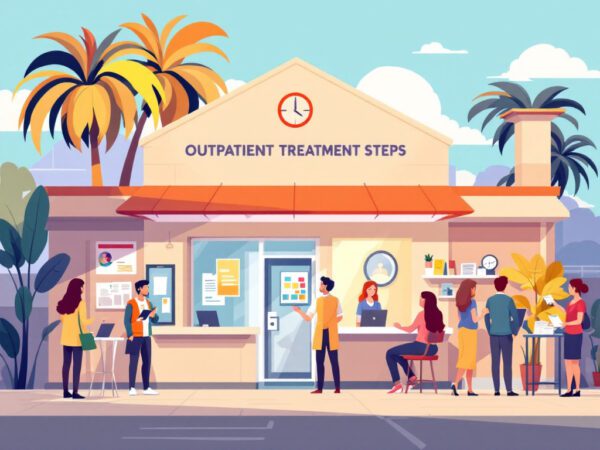Understanding Dissociative Disorders
Dissociative disorders are complex mental health conditions that often arise as a coping mechanism in response to traumatic experiences. We will explore their definitions, types, and underlying causes to better understand these conditions.
Definition and Types
Dissociative disorders involve a disconnection from thoughts, identity, consciousness, and memory. Individuals may feel detached from reality, experience a lack of control over their thoughts or actions, or lose memories about their life Cleveland Clinic.
There are three primary types of dissociative disorders:
| Type of Disorder | Description |
|---|---|
| Dissociative Identity Disorder | Characterized by two or more distinct identity states or personalities that control an individual’s behavior, often linked to severe trauma or abuse. |
| Dissociative Amnesia | Involves the inability to recall important personal information, typically following a traumatic or stressful event. |
| Depersonalization/Derealization Disorder | Characterized by persistent feelings of detachment from oneself (depersonalization) or the surrounding environment (derealization). |
These disorders often develop as a result of short-term or long-term trauma, highlighting the need for appropriate care and treatment.
Causes of Dissociative Disorders
Most mental health professionals believe that the underlying cause of dissociative disorders is chronic childhood trauma, such as abuse or neglect. Research suggests that the severity of symptoms in adulthood correlates with the degree of childhood trauma experienced Better Health Victoria.
Other potential causes of dissociative disorders may include:
- Severe stress
- Psychological shock
- Natural disasters
- War or violence
- Substance abuse
Understanding the roots of dissociative disorders is crucial for providing effective treatment, often focusing on psychotherapy (talk therapy) as the primary treatment method Mind.
By recognizing the signs and symptoms of dissociative disorders, individuals and their loved ones can seek the appropriate care and support needed for recovery. It is essential to approach these disorders with compassion and understanding, as healing is achievable through the right diagnosis and treatment.
Treatment Approaches
Dissociative disorder treatment typically involves various approaches, including talk therapy and medication options. These methods aim to provide relief from the symptoms associated with dissociative disorders and help individuals regain control over their mental health.
Talk Therapy (Psychotherapy)
Talk therapy, or psychotherapy, is a cornerstone of treatment for dissociative disorders. This therapeutic approach enables individuals to explore their thoughts, feelings, and behaviors in a safe environment. Psychotherapy helps uncover the underlying causes of dissociation and build coping strategies for managing symptoms. Many therapists specialize in treating dissociative disorders, utilizing techniques tailored to individual needs.
Psychotherapy can take various forms, including:
| Type of Therapy | Description |
|---|---|
| Cognitive Behavioral Therapy (CBT) | Focuses on identifying and changing negative thought patterns. |
| Dialectical Behavior Therapy (DBT) | Combines cognitive and behavioral techniques with mindfulness practices. |
| EMDR Therapy | A specialized therapy designed to alleviate distress associated with memories of traumatic experiences. |
Through talk therapy, many individuals can learn new ways to cope and experience improvement in their daily lives. Professional help can be essential in this journey, as therapeutic relationships foster understanding and healing. For more on specialized techniques, explore our section on EMDR therapy.
Medication Options
While there are no specific medications that directly treat dissociative disorders, certain medications can help manage the symptoms associated with these conditions. Doctors often prescribe antidepressants, anti-anxiety medications, or antipsychotic medicines to help alleviate mental health symptoms. These medications may help stabilize mood and reduce intrusive symptoms that trigger dissociation.
Some commonly prescribed medications include:
| Medication Type | Examples | Purpose |
|---|---|---|
| Antidepressants | SSRIs (e.g., fluoxetine, sertraline) | Stabilize mood and reduce depressive symptoms. |
| Anti-anxiety | Benzodiazepines (e.g., lorazepam) | Help manage anxiety but are generally short-term options. |
| Antipsychotics | Quetiapine, olanzapine | Manage severe symptoms when necessary. |
Studies indicate that a combination of selective serotonin reuptake inhibitors (SSRIs) and lamotrigine, an anticonvulsant and mood stabilizer, can be effective, particularly for depersonalization-derealization disorder (The Recovery Village).
It is vital to consult with a healthcare provider to determine the best medication regimen tailored to individual needs. For information on how to manage addiction with a comprehensive approach, explore our resources on dual diagnosis treatment and other relevant programs.
By understanding these treatment options, we can better support individuals dealing with dissociative disorders on their path to recovery. Whether through talk therapy or medication management, each step taken is vital in the healing journey.
Specialized Therapies
In our journey toward understanding and healing dissociative disorders, we encounter specialized therapies that offer promising avenues for treatment. Two notable techniques are Eye Movement Desensitization and Reprocessing (EMDR) and Sensory Awareness Techniques.
Eye Movement Desensitization and Reprocessing (EMDR)
Eye Movement Desensitization and Reprocessing (EMDR) is a psychotherapy technique specifically designed for addressing traumatic life experiences in patients with dissociative disorders, particularly those suffering from PTSD. EMDR involves establishing a therapeutic alliance, evaluating traumatic memories, and engaging in the desensitization of negative thoughts, emotions, and sensations. This structured approach allows individuals to process their trauma effectively while minimizing emotional distress (PubMed Central).
For those with dissociative disorders, EMDR must be adapted to ensure safety and efficacy. Treatment may focus on specific memories for shorter periods to avoid overwhelming the individual with resurfacing traumatic memories—a phenomenon known as flooding. It’s essential that EMDR be administered by professionals trained in managing dissociative disorders, as proper treatment protocols can significantly enhance outcomes (Mind).
Sensory Awareness Techniques
Sensory Awareness Techniques provide another beneficial strategy for individuals with dissociative disorders. These techniques encourage a focus on sensory perceptions such as touch, sight, sound, and smell to anchor individuals in the present moment. This grounding practice is particularly effective for managing overwhelming anxiety and mitigating panic responses (PubMed Central).
Through sensory awareness, individuals learn to recognize and appreciate their physical sensations, which can help interrupt dissociative episodes and foster emotional regulation. This method serves as an excellent complement to other therapeutic approaches, creating a multifaceted treatment plan that addresses both psychological and sensory needs (Cleveland Clinic).
By exploring EMDR and Sensory Awareness Techniques as part of our treatment options, we can empower ourselves and our loved ones in our healing journeys. Each approach brings unique benefits that cater specifically to the experiences of those dealing with dissociative disorders, facilitating recovery and enhanced well-being. For more information about various addiction treatment options, see our resources on outpatient addiction treatment and intensive outpatient programs.
Challenges and Considerations
Addressing dissociative disorders involves understanding the complexities of treatment and the individual challenges that clients may face. Two significant areas to consider include anxiety management and cultural factors impacting treatment.
Anxiety Management
Anxiety and dissociation are closely related responses to stress, trauma, and chaos. For many of us experiencing dissociative disorders, managing anxiety is crucial. Anxiety symptoms can heighten dissociative episodes, making effective management essential for successful treatment. Anxiolytic medications are often utilized to reduce hyperarousal and intrusive thoughts associated with these disorders (The Recovery Village).
In therapy, we focus on teaching various distress tolerance skills that can aid in anxiety management. Specific methods include:
- Self-Soothing Techniques
- TIPP (Temperature, Intense exercise, Paced breathing, Paired muscle relaxation)
- ACCEPTS (Activities, Contribution, Comparison, Emotions, Push aways, Thoughts, Sensations)
- IMPROVE (Imagery, Meaning, Prayer, Relaxation, One thing in the moment, Vacation, Encouragement)
Using these strategies can significantly enhance emotional regulation, which is vital for people with dissociative disorders.
Cultural Factors in Treatment
Cultural background and beliefs can significantly influence how individuals relate to and seek treatment for dissociative disorders. Each culture has its own perspectives on mental health, which can affect both the stigmatization of these disorders and the willingness to engage in treatment.
Understanding and considering cultural factors is essential for healthcare providers when addressing dissociative disorders. We must ensure that treatment approaches are culturally sensitive and tailored to the unique experiences and values of the client. This can enhance therapeutic rapport and improve overall effectiveness.
Engaging in sensory awareness techniques is also beneficial, allowing individuals to focus on sensory perceptions like touch, sight, sound, and smell. This practice not only aids in grounding but also assists in managing overwhelming anxiety (PubMed Central).
By acknowledging these challenges and incorporating culturally-informed approaches into treatment plans, we can help pave the way for improved recovery and support for loved ones coping with dissociative disorders. For more information on specific treatments, visit our sections on outpatient addiction treatment and individualized intensive program.
Seeking Help and Support
NHS Treatment Options
For those seeking assistance with dissociative disorders, the NHS provides short-term and medium-term therapy options. Accessing the right treatment may require persistence while navigating available resources. Individuals interested in NHS services should advocate for themselves, as well as consider alternative therapy avenues. Therapists specializing in dissociative disorders can often be found through resources such as the UK Council for Psychotherapy (UKCP) or British Association for Counselling and Psychotherapy (BACP) websites. For further guidance on treatment options, please refer to our resources on dual diagnosis treatment and mental health outpatient services.
Though the NHS may not have specific medication licensed for treating dissociative disorders, healthcare providers may prescribe psychotropic drugs to manage concurrent symptoms, including depression and anxiety. It is vital to tailor medication to the individual’s unique challenges, ensuring that they receive comprehensive care.
| Treatment Options | Availability | Key Features |
|---|---|---|
| NHS Therapy | Limited | Short- and medium-term sessions, focus on immediate needs |
| Alternative Therapists | Variable | Specialized treatment for dissociative disorders through private practitioners |
| Medication | Conditional | Used for related symptoms, not specifically for dissociative disorders |
Recovery and Long-Term Outlook
Recovery from a dissociative disorder is achievable with the right diagnosis and appropriate treatment. Many individuals find that they can cease experiencing dissociative symptoms altogether, often as their separate identities converge into a singular sense of self. While complete cessation of symptoms may not be possible for everyone, effective treatment programs can empower individuals to regain control over their lives and identities.
In our experience, a supportive network and ongoing care significantly contribute to a positive long-term outlook. By participating in structured outpatient programs and aftercare planning, individuals can establish continuity in their recovery journey. As more people engage in their healing processes, they may find comfort in knowing that recovery is a personalized journey, requiring time and support.
Engaging with services that provide relapse prevention outpatient and recovery support outpatient can also enhance the chances of maintaining progress after treatment. Overall, understanding the options for addiction and mental health outpatient care can illuminate paths toward healing and stability.















